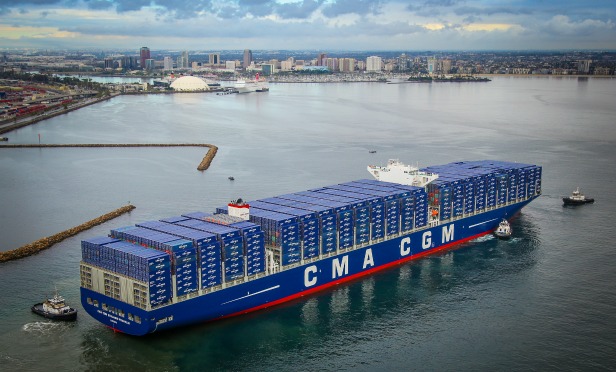 The Port of Long Beach is on track for another record year of cargo volumes for 2018. In November, cargo volumes at the port increased 1.5% over November 2017, pushing the port to 7,349,377 TEUs of cargo for the year. As a result, the Port of Long Beach says that it is “virtually certain” that it will surpass last year's cargo volume record of 7,544,507 TEUs. The strong cargo activity is a signal of a healthy and growing economy.
The Port of Long Beach is on track for another record year of cargo volumes for 2018. In November, cargo volumes at the port increased 1.5% over November 2017, pushing the port to 7,349,377 TEUs of cargo for the year. As a result, the Port of Long Beach says that it is “virtually certain” that it will surpass last year's cargo volume record of 7,544,507 TEUs. The strong cargo activity is a signal of a healthy and growing economy.
“Cargo moved is an indicator of how well the economy is doing. By that measure, the economy is doing well,” Lee Peterson of the Port of Long Beach tells GlobeSt.com. “2017 and 2018 are the first years since the Great Recession that the Port has surpassed the pre-recession levels of cargo. That's the significance, that the upswing in the economy has shown progress in increasing trade.”
The tight industrial market in Southern California—which continues to tighten—is another sign of the strong cargo activity in 2018. The Port of Long Beach sees the industrial market as a major benefit for the port. “There is more than a billion square feet of warehouse space in Southern California, which is a great asset for the logistics industry,” says Peterson. “We believe the tightness of the industrial real estate market is a function of the Southern California general real estate market.”
One of the drivers of the strong cargo volumes, in addition to the economic growth, is concern about trade tariffs. Retailers late in the year have stocked up product to mitigate potential higher costs next year as a result of potential tariffs. This could mean slow cargo volumes later in the year next year. “The administration and China came to an agreement to delay the next tier of tariffs,” says Peterson. “At least in the early year, we may see steady or increased volumes, outside of the effect of the Lunar New Year, which starts Feb. 5.”
Although there is general concern over trade policy and how it might impact cargo volumes, the Port of Long Beach—a major international port—is expected to do well despite trade issues. “We are dealing with a lot of uncertainty in trade policy. At the same time, a port like ours is a big ship, it takes a while to change course,” adds Peterson. “Administrations change, and we don't expect these tensions will last forever. We must continue upgrading our facilities to handle the larger vessels of today and tomorrow that come to Long Beach.”
That was proven this year. Despite trade issues and talk of a trade war along with other challenges, like cargo alliances, 2018 was a record-breaking year for cargo volumes. “Shippers like predictability, and 2018 was an uncertain year,” says Peterson. “What came into focus as the year progressed was American companies reacting to escalating tariffs by forwarding goods to beat the next tranche of tariffs. This artificial flowing of cargo to warehouses may have impacts on commerce in 2019.”
Want to continue reading?
Become a Free ALM Digital Reader.
Once you are an ALM Digital Member, you’ll receive:
- Breaking commercial real estate news and analysis, on-site and via our newsletters and custom alerts
- Educational webcasts, white papers, and ebooks from industry thought leaders
- Critical coverage of the property casualty insurance and financial advisory markets on our other ALM sites, PropertyCasualty360 and ThinkAdvisor
Already have an account? Sign In Now
*May exclude premium content© 2025 ALM Global, LLC, All Rights Reserved. Request academic re-use from www.copyright.com. All other uses, submit a request to [email protected]. For more information visit Asset & Logo Licensing.








